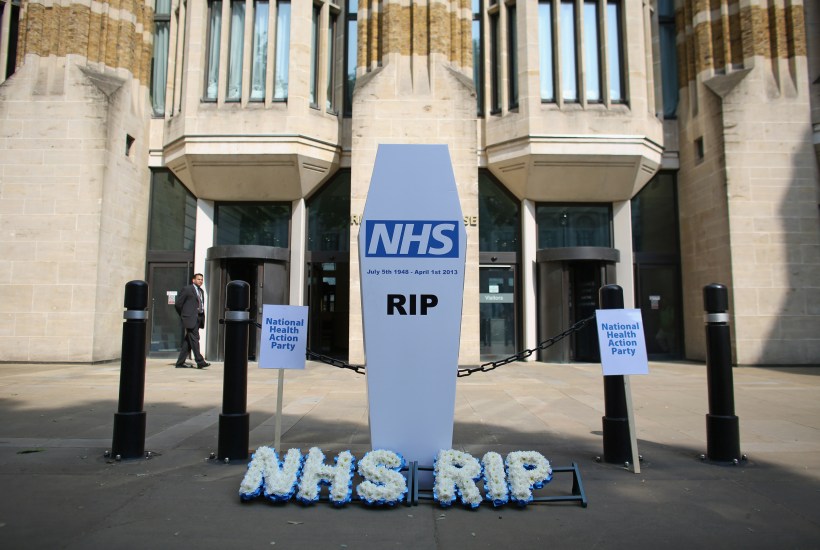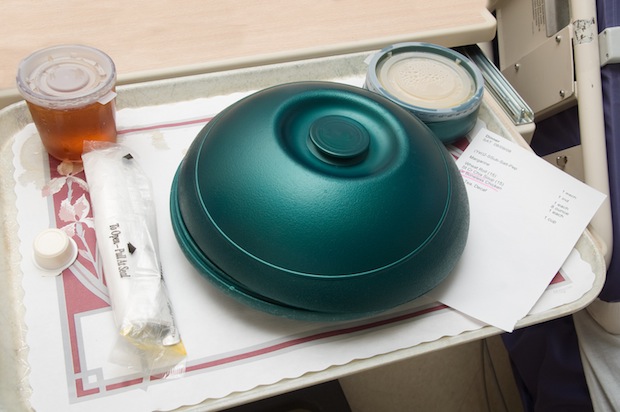Let’s not pretend that it’s just those hospital trusts investigated, or put on ‘special measures’ by Jeremy Hunt that are the problem. On my weekly trot around the wards of a big London teaching hospital, everything seems fine, the patients reasonably clean and well cared for. But over the months I’ve noticed that, even here, the NHS service is just not what it was — so many bits are being pared away.
First I met one of the hospital’s ‘Friends’, almost all of whom are now doughty ladies in their eighties. She mentioned that they are using some of their hard-won charity money to fund an art therapist who has been having a very good effect on stroke patients. The NHS no longer pays for them.
I remember when becoming an art therapist was a good option for an art student. It was a long and involved training, in art, teaching and counselling, but it led to fulfilling well-paid work. Only four years ago I met a young woman who was going into it after art school in the hope of lots of work. I thought she was a little bit optimistic at the time.
I made my usual visit to a man of 93 who has vascular dementia. He was very happy today after a short walk assisted by a nurse. I noticed that his feet looked awful, with long, twisted toenails and rough gnarled lumps of nail accruing on some toes. He told me that his own doctor had made an appointment with a chiropodist for him, and he was still waiting. That was eight years ago. I asked the ward sister if they could get him a hospital chiropodist.
‘Oh, we have big issues with that,’ she said, meaning, no they can’t get them. ‘There are none on site these days,’ she said. ‘And it’s very hard to get them to come in.’
In the next men’s bay, I saw what looked like a woman, with bountiful, abundant white hair. It turned out to be an elderly man, an elegant moustachioed Robert Louis Stevenson lookalike, who had come in as an emergency after having a heart attack in his shower. His hair looked completely matted. I offered to comb it for him. He said he had not had time to bring in his comb or his phone charger, but he hoped a friend might bring the charger. As he had no phone he couldn’t request any toiletries. There are no combs or toothbrushes on offer to NHS patients.
Almost all the patients I see are longing to go home, but too weak to take care of themselves. They need building up — a hearty convalescent home on the south coast of the type we still had on offer in the 1980s might do it, or at least some robust good food. But in hospital I never see any evidence of dishes that could build up any living creature. A mouse would waste away on it. Relatives have to bring in appetising fare and fresh fruit.
In another ward the TV had been out of order for weeks. It needs a new digibox, but there is no one to get one. It reminded me of when I worked in HMP Wormwood Scrubs, when very little was available in terms of basic healthcare and if something broke down, such as the dentist’s chair, it was not repaired for months. But scarcity of resources is causing much graver situations than that.
I visit a lady who has a lethal cancer. After being misdiagnosed by her GP for two years, she now needs an operation urgently. She is turning yellow because her bile duct is blocked. She was supposed to have the operation to relieve this last week, but it was cancelled at the last minute. ‘The doctors ran out of time,’ the nursing sister told me with what seemed like genuine sadness.
Since then the patient has developed an infection which prevents the required operation, and she is in danger of a cardiac arrest. She is also very weak and not eating. ‘What can we do?’ said the sister, as if a whole giant apparatus of helplessness was bearing down on her.
‘It’s just postpone, postpone, postpone,’ said the woman when I saw her, her husband standing by her bed looking anguished.
He told me that he has a problem with one of his knees. I mentioned that I had once had a similar problem when I was walking to Machu Picchu in Peru. The woman suddenly seemed to become animated; her eyes lost their hopelessness.
‘That is what she wants to do,’ he told me.
‘I wanted to go there but I had the family to worry about,’ she said. ‘Now they are all grown up and left home, but instead of doing the things I wanted, I have this.’
I saw her sink into sadness again, so I described the place I’d stayed in the last time I was in Peru, the Inkaterra, right in the Andean jungle, where there are rescued bears pottering about eating bromeliads and abundant orchids. She made me write down the name of the hotel. By the time I left them I think I had brightened her up a bit. Hopefully she might even get to the Andes one day. Where there is life there is hope, even if your life hangs on the bare bones of the NHS.
Got something to add? Join the discussion and comment below.
Get 10 issues for just $10
Subscribe to The Spectator Australia today for the next 10 magazine issues, plus full online access, for just $10.
Jane Kelly is a consulting editor at the Salisbury Review.
You might disagree with half of it, but you’ll enjoy reading all of it. Try your first month for free, then just $2 a week for the remainder of your first year.














Comments
Don't miss out
Join the conversation with other Spectator Australia readers. Subscribe to leave a comment.
SUBSCRIBEAlready a subscriber? Log in